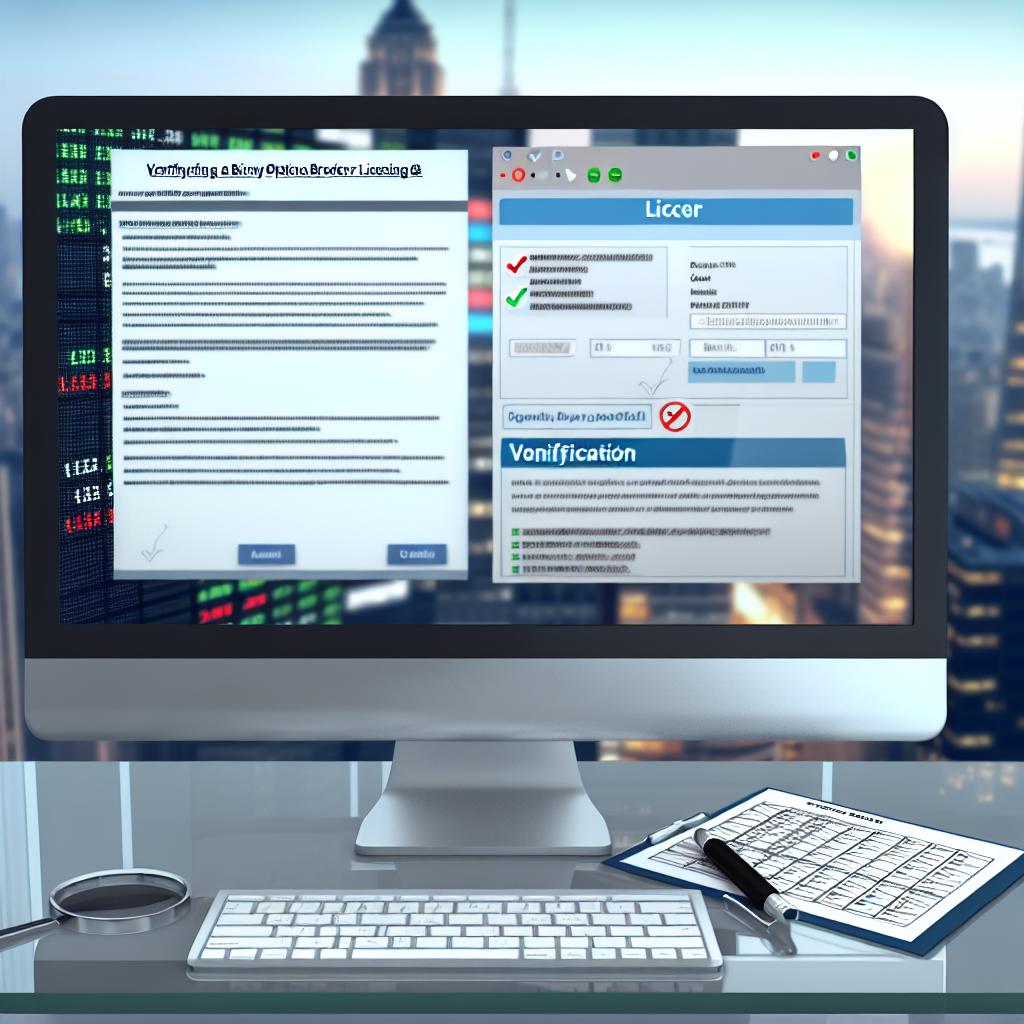How to Verify a Binary Options Broker’s Licensing and Regulation
Understanding the Importance of Licensing and Regulation
Binary options trading has become an attractive venture for many aspiring traders and investors. Structured as a straightforward financial instrument, trading binary options involves predicting the direction of an asset’s price over a set duration. The simplicity of such trades appeals to both newcomers and seasoned traders in financial markets. However, it’s important to recognize that the choice of broker significantly influences the safety and legality of your trading activities. Engaging with a broker that is properly licensed and regulated is essential for ensuring both safety and accountability, thereby protecting traders from potential fraudulent activities and financial loss.
Why Licensing and Regulation Matter
Licensing and regulation are crucial parameters that serve not only as a benchmark for traders to evaluate binary options brokers but also as essential elements for maintaining orderly and fair markets. A broker adorned with a license from a recognized regulatory body is an indication that the entity adheres to industry standards and operates within a framework monitored by relevant authorities. This scrutiny plays a pivotal role in minimizing mismanagement, preventing unethical practices, and rectifying trader grievances.
Key Regulatory Authorities
Trading institutions across global markets are regulated by an array of governmental and independent bodies. These regulatory authorities have distinct roles to ensure market integrity and protect traders’ interests. Their oversight extends to financial compliance, risk management, and the enforcement of legal standards that prevent market abuse. Here are some of the key regulatory bodies:
- Cyprus Securities and Exchange Commission (CySEC): An esteemed regulator in the European space, CySEC is instrumental in overseeing a significant chunk of binary options trading, thanks in part to Cyprus’s investor-friendly business regulations.
- Financial Conduct Authority (FCA) in the UK: Recognized for its rigorous and exacting regulatory standards, the FCA comprehensively covers financial services in the UK, thereby ensuring that entities uphold consumer protection and market integrity.
- Commodity Futures Trading Commission (CFTC) in the US: With a mandate to foster open, transparent, and financially sound markets, the CFTC regulates futures and option markets in the United States, ensuring market competitiveness and reducing systemic risk.
Steps to Verify a Broker’s Licensing and Regulation
To safeguard your investments against potential threats and to ascertain the compliance of your chosen broker, verification of the broker’s licensing and regulation is imperative. The following steps can serve as a guideline to ascertain the regulatory status of a broker:
Check the Broker’s Official Website
Initially, head to the broker’s official web domain, which should be the primary source of information. Authentic and reputable brokers often exhibit their regulatory credentials and relevant data conspicuously. This will typically include a section dedicated to legal compliance where the website should detail the regulatory authority’s name, registration, or the license numbers assigned.
Cross-Verify with Regulatory Authorities
Upon procuring the necessary license information from the broker’s website, it’s crucial to verify its legitimacy through the regulatory body’s official site. These websites generally house a public register, where you can enter the license or registration numbers provided to confirm their authenticity. Undertaking this due diligence helps you confirm whether the broker genuinely operates under the standards and protections claimed.
Understanding the Information Provided
In addition to verifying authenticity, it’s important to delve into detailed information available on the regulator’s platform. This includes a review of the broker’s current licensing status, as well as any sanctions, fines, or disciplinary actions that might have been applied. Understanding these elements is pivotal for making informed decisions when choosing where to invest.
Seek Feedback from Reputable Sources
In the digital age, trader forums, social media platforms, and review sites offer a wealth of information concerning broker performance, customer interactions, and the overall reliability of brokers. Engaging with these platforms to seek feedback from traders with firsthand experience can offer valuable insights into the broker’s reputation and trustworthiness.
Additional Considerations
While licensing and regulation form the crux of evaluating a broker, other factors contribute to a comprehensive assessment. These considerations ensure that traders not only pick a secure broker but one that aligns with their trading needs and expectations.
Evaluate the Broker’s Transparency
A regulated broker is expected to maintain transparency in their operations. They should provide unfettered access to critical information regarding trading conditions, cost structures, and potential risks inherent in trading binary options. Brokers that offer vague, misleading, or incomplete information should raise red flags regarding their dependability.
Assess the Customer Support
Reliable customer support is integral to a trader’s experience with a broker. A broker compliant with regulations will typically offer comprehensive customer support services. These services should be accessible, knowledgeable, and capable of adeptly addressing client inquiries and issues that may arise during the trading process.
Recognize Promotional Warnings
Exercise due caution when confronted with brokers that make outlandish promises of guaranteed returns or extraordinarily high profits. Licensing and regulation ensure ethical conduct rather than promise profitability. Hence, traders should remain skeptical of any assurances of financial gains, recognizing that trading inherently involves risk.
In conclusion, validating a broker’s licensing and regulation is of paramount importance for any individual participating in binary options trading. Ensuring that a chosen broker is accountable to regulatory standards significantly diminishes the risk of encountering fraudulent practices. Thus, traders enjoy a more secure trading experience, with the peace of mind that there is recourse in environments governed by just and transparent policies.
This article was last updated on: August 25, 2025

